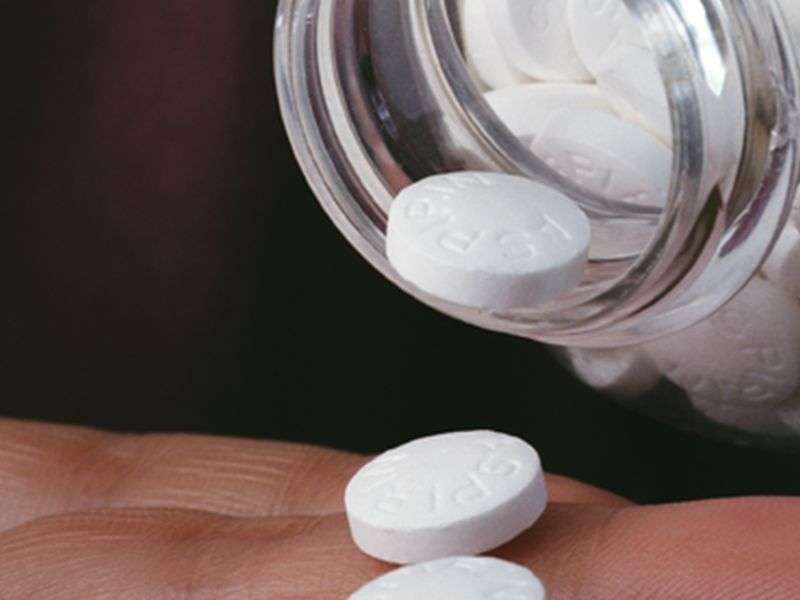Can daily low-dose aspirin lower cancer death risk?

(HealthDay)—Millions of Americans take low-dose aspirin every day for heart health. In doing so, they may also slightly lower their risk of dying from several cancers, a large new study suggests.
Researchers found that among more than 130,000 U.S. adults, those who regularly used aspirin were 7 percent to 11 percent less likely to die of cancer over the next few decades.
The risks of dying from colon, breast, prostate and—for men—lung cancer were all lower among regular aspirin users, compared to non-users, the findings showed.
The findings add to evidence that aspirin has cancer-fighting abilities, the researchers said. But they also stressed that people should not start popping a daily aspirin in the hopes of avoiding cancer.
There is strong evidence, from research in general, that low-dose aspirin may lower the risk of colon cancer, said Dr. Ernest Hawk, a professor at the University of Texas M.D. Anderson Cancer Center in Houston.
The U.S. Preventive Services Task Force (USPSTF) already recommends that certain older adults consider taking low-dose aspirin to curb their risk of colon cancer—as well as heart disease.
Specifically, the task force suggests that people in their 50s and 60s talk to their doctor about whether the benefits of daily aspirin outweigh the risks. The USPSTF is an independent medical panel that advises the federal government.
The "talk to your doctor" part is critical, said Hawk, who wasn't involved in the new study.
For one, he said, aspirin has risks, such as stomach bleeding and hemorrhagic (bleeding) stroke. So people need to discuss those potential harms with their doctor.
Plus, even within the 50-to-69 age group, not everyone stands to benefit from aspirin to the same degree. The task force recommends that low-dose aspirin (typically 81 milligrams a day) be considered only for people at increased risk of suffering a heart attack or stroke in the next 10 years.
Yin Cao, the lead researcher on the new study, agreed that people should not start using aspirin without talking to their doctor.
She said her findings "add evidence to support the USPSTF recommendation on colon cancer."
But research has been more mixed regarding breast, prostate and lung cancers. And, the new findings don't prove that aspirin use prevents those diseases, said Cao, an instructor at Harvard Medical School and Massachusetts General Hospital, in Boston.
The study included more than 130,000 U.S. health professionals who were followed for up to 32 years. They were asked about their aspirin use at the outset, and again every two years.
Nearly 13,000 study participants died of cancer over the next few decades. But the risks were somewhat lower for regular aspirin users, the study authors said.
The biggest difference was seen with colon cancer: Aspirin users were about 30 percent less likely to die of the disease.
In addition, women who used aspirin were 11 percent less likely to die of breast cancer, while men showed a 23 percent lower risk of dying from prostate cancer and a 14 percent lower risk of lung cancer death.
However, Hawk said, the findings can only point to correlations. "It's always possible that aspirin use is a surrogate for a healthy lifestyle, in general," he said.
Cao said her team tried to account for other lifestyle and health factors. But she agreed the findings don't prove cause and effect.
Another issue is that no one knows how much aspirin is needed to see a benefit—or how long it takes to kick in, said Dr. Robin Mendelsohn.
Mendelsohn, who was not involved in the study, is a gastroenterologist at Memorial Sloan Kettering Cancer Center in New York City.
"Many of the studies in colorectal cancer," she said, "indicate that it takes many years to see a decrease in cancers [with aspirin use]."
Mendelsohn stressed that any decision to start on daily aspirin "needs to be individualized and discussed with a physician."
"And, of course," she added, "taking an aspirin doesn't take the place of regular age-appropriate screening" for colon cancer.
Cao was scheduled to present the findings Monday at the annual meeting of the American Association for Cancer Research in Washington, D.C. The results should be considered preliminary until published in a peer-reviewed medical journal.
More information: Yin Cao, Sc.D., M.P.H., instructor, medicine, Massachusetts General Hospital, Harvard Medical School, Boston; Ernest Hawk, M.D., M.P.H., vice-president and division head, Cancer Prevention and Population Sciences, University of Texas M.D. Anderson Cancer Center, Houston; Robin Mendelsohn, M.D., gastroenterologist, Memorial Sloan Kettering Cancer Center, New York City; April 3, 2017, presentation, American Association for Cancer Research annual meeting, Washington, D.C.
The U.S. National Cancer Institute has an overview on aspirin and cancer risk.
Copyright © 2017 HealthDay. All rights reserved.



















